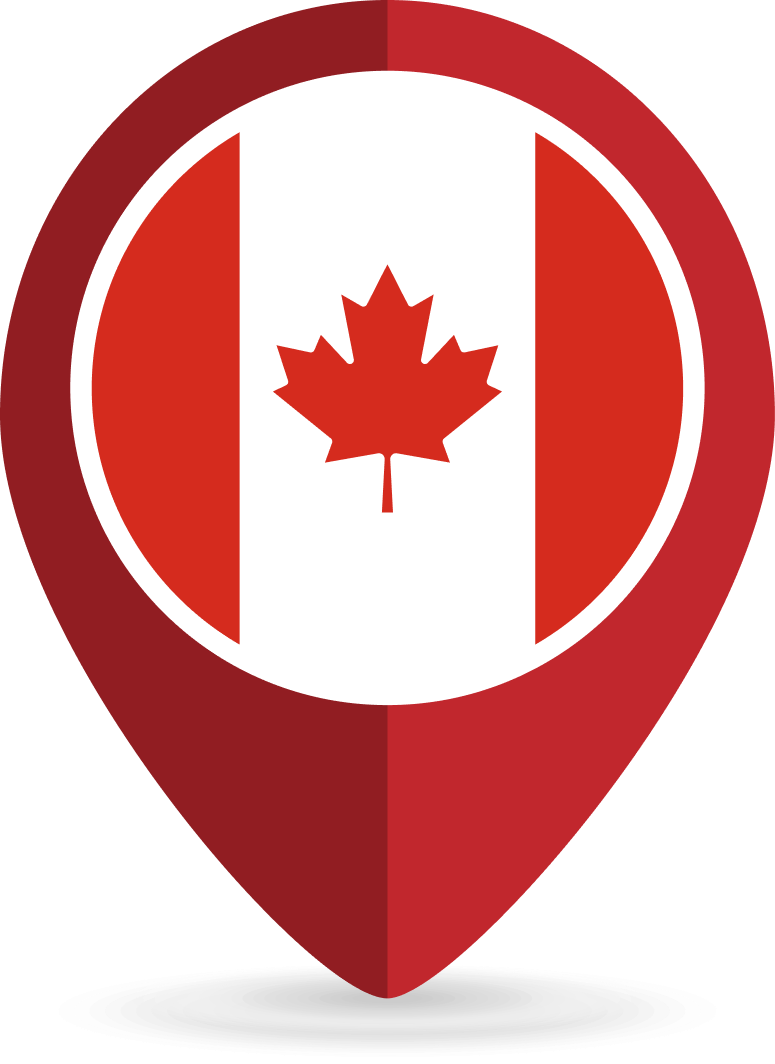Study in Canada for Indian Students – Top Universities, Courses, Scholarships
Canada stands out as a premier destination for international students, and the numbers speak volumes. According to data from Immigration, Refugees and Citizenship Canada (IRCC) in 2022, the country hosted 551,405 international students from 184 countries. A substantial portion of this international student community, totaling 226,450 individuals, comprised students from India.
As of December 31, 2022, India solidified its position among the top 10 countries sending students to Canada, contributing a significant 319,130 students to the vibrant international student landscape.
The appeal of studying in Canada lies in various factors. A high standard of living, coupled with flexible and quality education options, positions Canada as an ideal choice for those seeking an enriching academic experience. The country prides itself on fostering a diverse and inclusive environment, making it welcoming to students from all corners of the world. Moreover, Canada offers affordable education with a promising long-term return on investment.
Highlighting Canada’s global standing, the U.S. News & World Report for 2022 ranks Canada at an impressive 3rd place worldwide for the best quality of life. This recognition further solidifies Canada’s reputation as a top-tier destination for international students.
In essence, Canada consistently attracts hundreds of thousands of students globally each year, making it a standout choice for academic excellence and cultural diversity.
Why Study in Canada For Indian Students?
Choosing Canada as your study destination comes with a myriad of benefits, making it an increasingly popular choice among indian students. Here are some compelling reasons to consider studying in Canada:
World-Class Universities: Canada boasts world-class universities that consistently rank among the top globally. In the QS World University Rankings 2024, nine Canadian universities secured positions within the first 200 ranks. The Times Higher Education (THE) World Universities Rankings 2023 also placed seven Canadian universities in the top 200.
Affordable Education: Compared to the US and UK, Canada offers a more affordable education, making it a financially viable option for Indian students. The return on investment is notably attractive, and students can explore various Canadian scholarships to ease the financial burden.
Cultural Diversity: Canada is celebrated for its welcoming and warm atmosphere, with people hailing from diverse ethnic groups, cultures, and lifestyles. This multicultural environment fosters friendliness and peaceful living, setting Canada apart. With over 250 ethnic origins, 200 languages, and 70 indigenous languages spoken, international students find themselves in a rich tapestry of cultural diversity.
Lively and Vibrant Campus Life: Canadian universities provide a lively and vibrant campus life with a plethora of fests, events, and activities throughout the year. This not only creates a joyful environment but also facilitates networking opportunities and the chance to meet new people, helping students combat homesickness.
Immigration Opportunities – PGWP Canada: For Indian students studying in Canada, the Post-Graduation Work Permit (PGWP Canada) is a significant advantage. This permit allows students to stay in Canada after completing their graduation and gain valuable work experience. The PGWP can extend up to three years, providing an excellent opportunity for international students to immerse themselves in the Canadian workforce.
Popular Courses to Study in Canada for Indian Students
Canada is recognized for its outstanding education system, offering diverse courses across different academic levels. The Canadian education system encompasses undergraduate, graduate, and postgraduate programs, providing students with a rich array of learning opportunities.
Undergraduate Programs:
At the undergraduate level, students can pursue either a Bachelor’s or Associate’s degree, with programs typically spanning 3 to 4 years. This foundational stage sets the tone for a deeper exploration of academic disciplines.
Graduate Programs:
Moving to the graduate level, students can opt for Master’s or Doctoral degrees, delving into more specialized fields. Graduate study programs in Canada generally extend over 2 to 6 years, allowing for in-depth research and academic exploration.
Postgraduate Courses:
Postgraduate courses in Canada often take the form of diploma programs, providing focused and practical education that lasts for 1 to 2 years. These courses serve as a bridge between academic theory and real-world application.
Canadian higher education institutions prioritize experiential learning, emphasizing practical settings to enhance students’ understanding of concepts. This hands-on approach allows students to gain valuable insights and develop practical expertise in their chosen field, contributing to a well-rounded educational experience.
Popular Courses for Indian Students in Canada:
Indian students are drawn to a variety of courses in Canada that align with global industry trends. Some highly preferred courses include:
- International Business Management: Nurturing skills for global business environments.
- Master of Business Administration (MBA): Focused on leadership and strategic management skills.
- IT & Computer Science: Exploring the dynamic world of information technology.
- Engineering: Delving into diverse engineering disciplines for technological innovation.
- Health, Biosciences, and Pharmacy: Addressing critical aspects of healthcare and pharmaceuticals.
- Media & Journalism: Crafting narratives in the evolving landscape of media.
| Name of the Course | Average Annual Tuition Fee in CAD |
| International Business Management | CAD 15,000 – 25,000 |
| Master of Business Administration | CAD 30,000 – 40,000 |
| IT & Computer Science | CAD 20,000 – 40,000 |
| Engineering | CAD 30,000 – 50,000 |
| Health, Biosciences & Pharmacy | CAD 30,000 – 50,000 |
| Media & Journalism | CAD 20,000 – 30,000 |
Top Universities in Canada for Indian Students
| Name of University | University Best Known For | QS WUR, 2023 | THE, 2023 |
| University of Toronto | One of the world’s top research-intense universities driven to invent and innovate. | 21 | 18 |
| McGill University | One of Canada’s best-known institutions that provides Engineering courses. | 30 | 46 |
| University of British Columbia | Popular for teaching and research and a consistent global ranker. | 34 | 40 |
| University of Montreal | Has the largest university complex and a popular research university in Canada. | 141 | 111 |
| University of Alberta | One of Canada’s top teaching and research universities, known for providing the best Engineering, Humanities, Health Sciences and Business courses. | 111 | 118 |
| McMaster University | A popular research-intense university in Canada which has its own nuclear reactor for research. | 189 | 80 |
| University of Waterloo | Known for providing matchless Computer Science, Engineering, Science and Math courses. | 112 | 201-250 |
| Western University | A consistent ranker in the top 1% of the universities in the world and known for showing excellent leadership in education, research and healthcare. | 114 | 201-250 |
| University of Ottawa | Canada’s top 10 research university and thrives on Excellence, Relevance and Impact. | 203 | 137 |
| University of Calgary | One of Canada’s top research-intense universities with the best university culture and diversity. | 182 | 201-250 |
Requirements for Studying in Canada for Indian Students
To study in Canada as an Indian Student, adherence to specific immigration policies is crucial. Commencing this journey requires obtaining a study permit, a necessary document for enrollment at Canada’s Designated Learning Institutions (DLIs). It’s important to note that the study permit is not a visa but is indispensable for starting an educational journey in the country. In addition to the study permit, students must acquire a visitor visa or an electronic travel authorization (eTA) to enter Canada legally. Upon approval of the study permit, Canada’s Immigration officers will issue the visitor visa or an eTA.
The standard study visa category typically takes 4 to 8 weeks for processing. However, for students seeking an expedited entry into Canada, the Student Direct Stream (SDS) study visa process is available, significantly reducing processing time to just 20 days.
Indian students stand as eligible candidates under the SDS category. By diligently submitting the required documents, they can facilitate the swift processing of their visas, ensuring a seamless transition into their academic pursuits in Canada. This streamlined process reflects Canada’s commitment to welcoming international students and simplifying immigration procedures for a diverse and global learning community.
How to apply for a Student Visa for Canada?
To apply for a Student Visa for Canada, the process primarily involves online applications. However, in certain circumstances, applying on paper is an option. To apply on paper, students must,
- Have a disability preventing them from applying online.
- Hold an identity or travel document for non-national residents, refugees, or stateless persons.
Who can apply for a Canadian Student Visa?
Eligibility for a Canadian Student Visa is contingent upon meeting specific criteria. The primary requirement is receiving an offer letter of admission from one of Canada’s Designated Learning Institutes. Secondary requirements include providing proof of funds to cover tuition fees for all study years, living expenses for both the applicant and any accompanying family members, as well as the cost of return air tickets.
Additional criteria for eligibility include:
- No Criminal Record Certificate:
- Applicants must provide a certificate demonstrating a clean criminal record.
- Medical Examination Certificate:
- A medical examination certificate is required to ensure the applicant’s health meets Canadian standards.
- Valid Reasons for Studying and Leaving:
- Applicants should present documents outlining valid reasons for studying in Canada and an intention to leave upon completion of the study period.
Students who fulfill these requirements are deemed eligible to apply for a Canadian Student Visa.
When to apply for a Canadian Student Visa?
It is advisable to initiate the Canadian Student Visa application as soon as you receive your Offer Letter of Admission. The processing time for the Canadian Student Visa may take approximately 4 to 8 weeks, or longer, depending on the country from which you are applying. Applying early ensures ample time for processing and any unforeseen delays.
Cost of Applying for a Canadian Student Visa: The cost associated with applying for a Canadian Student Visa includes several components:
- Canada Student Visa Processing Fee:
- The processing fee for a Canadian Student Visa is CA$150.
- Biometrics Fee:
- Applicants are required to pay a biometrics fee, which is $85.
- Service Fee:
- Additionally, there is a service fee of $45.
What are the documents required to apply for the Canadian Student Visa?
To apply for a Canadian Student Visa, you need to provide a set of essential documents to the immigration authorities. Here is a comprehensive list:
- Offer Letter of Admission:
- Proof of acceptance from a Designated Learning Institution in Canada.
- Valid Passport:
- Your passport, serving as proof of identity.
- Proof of Funds:
- Demonstrating that you have sufficient funds to cover tuition, living expenses, and return travel. This can be in the form of:
- A Canadian bank account in your name with transferred funds in Canadian Dollars.
- A Guaranteed Investment Certificate (GIC) from a Canadian financial institution.
- Proof of a student or education loan from a bank.
- A bank draft that can be converted into Canadian dollars.
- Demonstrating that you have sufficient funds to cover tuition, living expenses, and return travel. This can be in the form of:
- Proof of Payment:
- Evidence that you have paid your tuition and housing fees.
- Sponsorship Letter:
- If your education is sponsored by a school or an individual, include a letter from the sponsor.
- Scholarship Proof:
- If you have received a scholarship, provide relevant documentation.
- Quebec Acceptance Certificate (CAQ):
- If you applied to universities in Quebec, include an attestation of the issuance of your Quebec Acceptance Certificate.
- Letter of Explanation:
- A letter detailing your reasons for studying in Canada and an acknowledgment of your responsibilities as an international student.
Documents Required to Study in Canada for Indian Students
In addition to the essential documents mentioned earlier, Indian students planning to study in Canada are typically required to submit the following documents:
- Statement of Purpose (SOP):
- A well-crafted SOP detailing your academic background, career goals, and reasons for choosing the specific course and institution in Canada.
- Letter of Recommendation (LOR):
- Recommendation letters from academic or professional referees attesting to your qualifications, achievements, and suitability for the chosen program.
- English Language Proficiency Certificate:
- Score certificate from a recognized English language proficiency test such as IELTS, TOEFL, or equivalent. This demonstrates your language skills and ability to succeed in an English-language academic environment.
- Work Experience Certificate (if applicable):
- If you have relevant work experience, especially for postgraduate programs, include a work experience certificate outlining your roles, responsibilities, and achievements.
- CV/Resume:
- A comprehensive curriculum vitae (CV) or resume highlighting your educational qualifications, work experience, skills, and any other relevant achievements.
Intakes to Study in Canada for Indian Students
In contrast to the single intake system in many Indian universities, Canadian colleges and universities typically offer three intakes, which are sometimes referred to as semesters. These intakes provide flexibility for Indian students planning to study in Canada:
- Fall Intake:
- The Fall intake, commencing in the month of September, is particularly popular among Indian students. It aligns with the beginning of the academic year in Canada.
- Winter Intake:
- Starting in January, the Winter intake serves as an excellent alternative for those who may have missed the September intake. It provides an opportunity to begin studies in the middle of the academic year.
- Summer Intake:
- Although less common and available for limited programs and colleges, the Summer intake typically begins around April and May. It caters to specific courses and institutions, offering an additional entry point for students.
| Semester Intake | Deadline |
| Fall or September Intake | December – March |
| Winter or January Intake | September – November |
| Summer or May Intake | January – February |
Intakes to Study in Canada for Indian Students
Understanding the cost of studying and living in Canada is crucial for indian students considering education abroad. While these costs may not be formal requirements, they play a significant role in the decision-making process. Here’s an overview of the total cost of study in Canada for Indian Students:
- Tuition Fees:
- The primary expense, depending on the type of qualification and institution.
- Approximately CAD 7,000 to CAD 35,000 per year.
- The approximate cost for Indian students ranges from INR 3,50,000 to 19,00,000 per year, varying with the chosen course.
- Accommodation:
- On-campus residence options are available.
- Off-campus accommodation includes sharing with other students, costing around CAD 8,000 to CAD 10,000 annually for on-campus and CAD 400 to CAD 700 per month for off-campus.
- In prime areas, costs can reach up to CAD 1000 to CAD 2000 per month.
- Living Expenses:
- Covering various costs like communication, transport, books, supplies, and daily necessities.
- A single student budget in Canada is approximately CAD 6,000 to CAD 10,000.
- Miscellaneous:
- Visa and study permit costs are around CAD 150.
- Health and insurance expenses range from CAD 300 to CAD 800 per year.
| Types of Expenses | Yearly Cost |
| Tuition Fees | CAD 7,000 to CAD 35,000 (INR 3,50,000 to 19,00,000) |
| Accommodation | CAD 7,200 to CAD 24,000 (INR 3,91,054 to INR 13,03,515) |
| Other Living Expenses (Grocery, transportation, etc.) | CAD 6,000 to CAD 10,000 (INR 3,23,881 to INR 5,39,802) |
| Miscellaneous | CAD 1,000 (INR 53,980) |
| Total (with tuition fees) | CAD 21,200 to CAD 66,500 (INR 11,44,382 to INR 37,78,620) |
| Total (without tuition fees) | CAD 14,200 to CAD 35,000 (INR 7,66,520 to INR 18,89,310) |
Scholarships to Study in Canada for Indian Students
| S. No | NAme of the Scholarship | Description |
| 1. | Shastri Indo-Canadian Institute: | Offers various fellowships at different levels, ranging from graduate to post-doctorate, covering research and training fellowships. |
| 2. | Canadian Commonwealth Scholarship and Fellowship Plan: | Identifies students with high intellect from Commonwealth countries, supporting programs of advanced study and research at the Master’s and Ph.D. levels. |
| 3. | Ontario Graduate Scholarship Program: | Available for graduate students across a wide variety of disciplines. |
| 4. | National Research Council of Canada (NRCC): | Research associateship offered to master’s degree holders in engineering and Ph.D. holders in natural science or engineering disciplines. |
| 5. | Quebec Provincial Government Scholarship: | Aimed at students studying in Quebec. |
| 6. | Ontario Trillium Scholarship: | Initially announced in November 2010 for doctoral students worldwide seeking to study in Ontario. |
| 7. | Partnership Grants by the Social Sciences and Humanities Research Council of Canada: | Specifically for Ph.D. candidates. |
| 8. | Banting Postdoctoral Fellowships: | Offered by the Canadian government to international students pursuing postgraduate programs in natural science, social sciences, or healthcare research. |
| 9. | Vanier Canada Graduate Scholarships: | Awarded by the Government of Canada to meritorious students aspiring to pursue a doctoral degree at a Canadian institution. |
Living Expenses to Study in Canada for Indian Students
| Expenses | Cost in CAD | Cost in INR |
| Accommodation | $800 – $2,500 | ₹42,000 – ₹1,31,000 |
| Utilities (electricity, water) | $50 – $150 | ₹2,600 – ₹7,900 |
| Internet | $50 – $100 | ₹2,600 – ₹5,200 |
| Groceries | $200 – $400 | ₹10,400 – ₹20,800 |
| Transportation | $90 – $120 | ₹4,700 – ₹6,300 |
| Eating Out | $10 – $25 | ₹520 – ₹1,300 |
| Mobile Phone | $50 – $100 | ₹2,600 – ₹5,200 |
| Textbooks and Supplies | $500 – $1,000 | ₹26,000 – ₹52,000 |
| Health Insurance | $600 – $1,000 | ₹31,200 – ₹52,000 |
Career Opportunities after Studying in Canada
| Job Roles | Average Salary in CAD |
| Business Intelligence Analysts | $77,870 |
| Cloud Architects | $121,555 |
| Cloud Systems Engineer | $120,000 |
| IT Project Manager | $91,300 |
| Data Scientists | $85,461 |
| Developers (Web, Software, Mobile) | $75,628 |
| DevOps Engineers | $89,187 |
| Full-Stack Developers | $88,542 |
| IoT Specialists | $105,000 |
| Security Specialists (Data, Information, Network, Systems, Cloud) | $100,000 |
CanadianSIM: Connecting Students and Newcomers in Canada
CanadianSIM is dedicated to making the transition for students and newcomers to Canada seamless by providing a reliable, easily attainable, affordable, and value-driven Canadian SIM card. Our tailored plans cater to the unique needs of those arriving in Canada, ensuring they stay connected effortlessly.
Key Features of CanadianSIM Plans:
- No Contract SIM:
- Our plans offer flexibility with no long-term contracts, allowing you to adapt your mobile connectivity based on your changing needs.
- Unlimited Canada Wide Calls:
- Stay connected with your peers, family, and friends across Canada with unlimited calls within the country.
- Unlimited Local & International Text Messaging (SMS):
- Keep in touch with loved ones locally and abroad with unlimited text messaging, providing you with a convenient and cost-effective communication solution.
- No Set-Up Fees:
- We believe in transparency, and that’s why there are no hidden fees or set-up costs. You pay for what you need, and we make it easy to understand.
- Caller ID & Voicemail:
- Enjoy the convenience of knowing who is calling with Caller ID, and never miss an important message with our included voicemail feature.
Related Posts



















